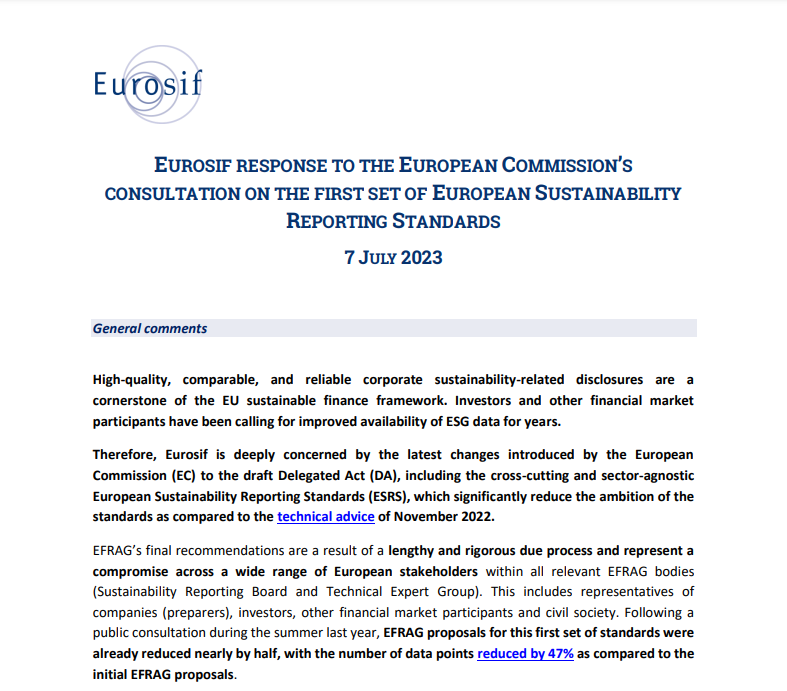Eurosif response to the European Commission’s consultation on the first set of European Sustainability Reporting Standards (ESRS)
High-quality, comparable, and reliable corporate sustainability-related disclosures are a cornerstone of the EU sustainable finance framework. Investors and other financial market participants have been calling for improved availability of ESG data for years.
Therefore, Eurosif is deeply concerned by the latest changes introduced by the European Commission (EC) to the draft Delegated Act (DA), including the cross-cutting and sector-agnostic European Sustainability Reporting Standards (ESRS), which significantly reduce the ambition of the standards as compared to the technical advice of November 2022.
Following strict due-process rules, EFRAG delivered a first set of standards which stroke the right balance addressing the needs of different stakeholders and the objective of the corporate sustainability reporting which is to improve availability, quality, comparability, and reliability of corporate ESG disclosures. The latest substantial modifications applied to these standards by the EC distort this carefully struck compromise, to the detriment of investors, the financial industry, and other stakeholders calling for improved sustainability disclosures. Following through on these changes would hamper the effectiveness of the Corporate Sustainability Reporting Directive (CSRD) as well as the implementation and coherence of the EU sustainable finance framework.
Eurosif issued a joint statement with PRI, IIGCC, EFAMA, UNEP FI and 92 investors and other financial market participants across Europe, calling on the European Commission to review its draft Delegated Act. In particular, Eurosif considers it crucial that the ESRS:
▪ Consider as always material, the key environmental and social disclosures necessary to comply with the SFDR, the Benchmark Regulation and Climate Benchmark Delegated Acts, as well as Pillar 3 disclosure requirements.
▪ Consider as always material, the key climate disclosure indicators and topics, including Scope 1, 2, and 3 GHG emissions, climate targets and transition plans.
▪ Require explanations in case a sustainability topic is not deemed material.
▪ Reconsider the voluntary nature of disclosures on biodiversity and own-workforce that would not be covered in the first point above, and require they are subject to materiality assessments.
Eurosif also regrets that the disclosures on diversity policies regarding ethnicity, age, minority or vulnerable group, and educational and professional backgrounds, which are relevant from the social justice perspective and considered by an increasing number of investors, are not covered in the final first set of ESRS. This contradicts the objectives of the European Union reflected in existing legislation on equality in the workplace. Improved availability and quality of diversity-related disclosures is important for a just climate transition. Eurosif’s consultation response reflects the concerns and perspectives of the responsible investors’ community which is committed to implement an ambitious sustainable finance framework in the EU. Sufficiently ambitious, comparable and reliable corporate reporting on sustainability-related risks, opportunities and impact is essential to enable investors to make informed investment decisions, comply with their own sustainable finance rules, and enable sustainable finance to support the transition towards a sustainable economy.
You can find the full response at the link below.

